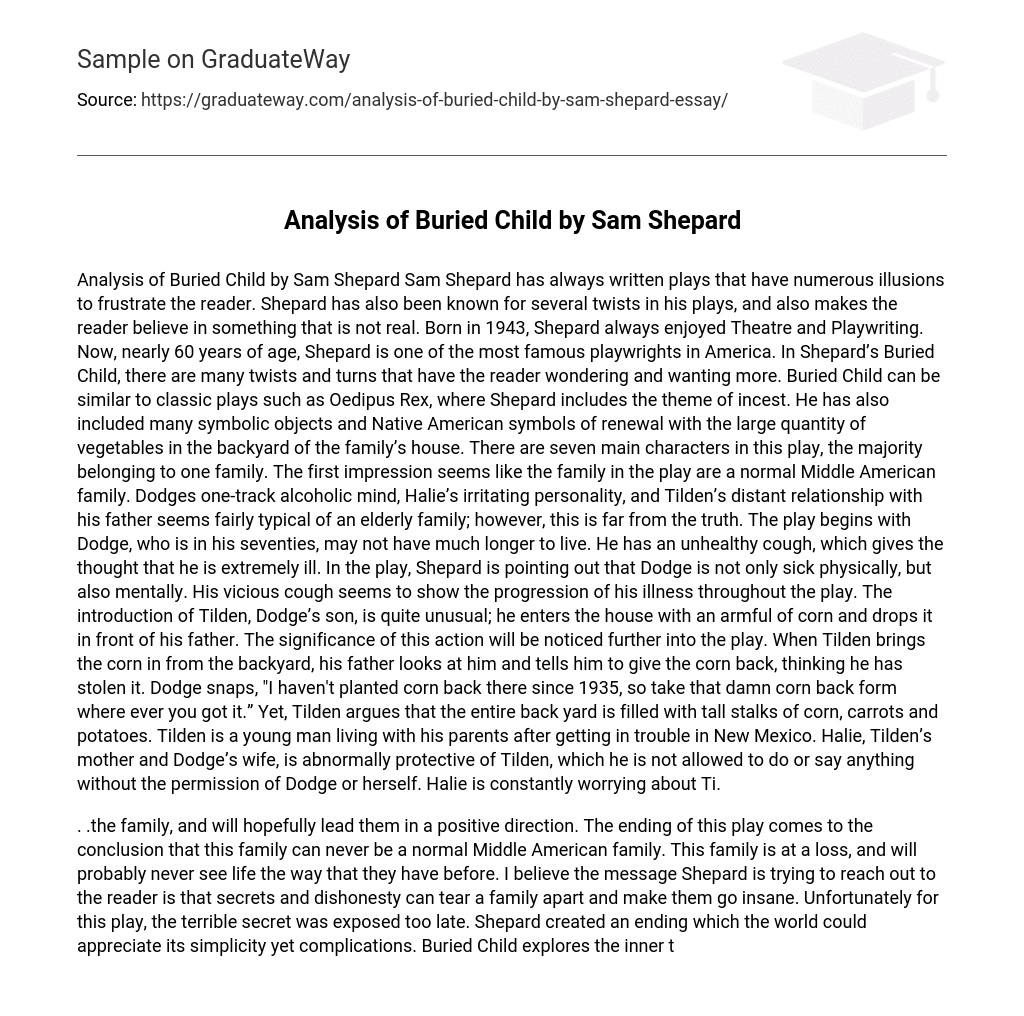Analysis of Buried Child by Sam Shepard Sam Shepard has always written plays that have numerous illusions to frustrate the reader. Shepard has also been known for several twists in his plays, and also makes the reader believe in something that is not real. Born in 1943, Shepard always enjoyed Theatre and Playwriting. Now, nearly 60 years of age, Shepard is one of the most famous playwrights in America. In Shepard’s Buried Child, there are many twists and turns that have the reader wondering and wanting more. Buried Child can be similar to classic plays such as Oedipus Rex, where Shepard includes the theme of incest. He has also included many symbolic objects and Native American symbols of renewal with the large quantity of vegetables in the backyard of the family’s house. There are seven main characters in this play, the majority belonging to one family. The first impression seems like the family in the play are a normal Middle American family. Dodges one-track alcoholic mind, Halie’s irritating personality, and Tilden’s distant relationship with his father seems fairly typical of an elderly family; however, this is far from the truth. The play begins with Dodge, who is in his seventies, may not have much longer to live. He has an unhealthy cough, which gives the thought that he is extremely ill. In the play, Shepard is pointing out that Dodge is not only sick physically, but also mentally. His vicious cough seems to show the progression of his illness throughout the play. The introduction of Tilden, Dodge’s son, is quite unusual; he enters the house with an armful of corn and drops it in front of his father. The significance of this action will be noticed further into the play. When Tilden brings the corn in from the backyard, his father looks at him and tells him to give the corn back, thinking he has stolen it. Dodge snaps, “I haven’t planted corn back there since 1935, so take that damn corn back form where ever you got it.” Yet, Tilden argues that the entire back yard is filled with tall stalks of corn, carrots and potatoes. Tilden is a young man living with his parents after getting in trouble in New Mexico. Halie, Tilden’s mother and Dodge’s wife, is abnormally protective of Tilden, which he is not allowed to do or say anything without the permission of Dodge or herself. Halie is constantly worrying about Ti.
. .the family, and will hopefully lead them in a positive direction. The ending of this play comes to the conclusion that this family can never be a normal Middle American family. This family is at a loss, and will probably never see life the way that they have before. I believe the message Shepard is trying to reach out to the reader is that secrets and dishonesty can tear a family apart and make them go insane. Unfortunately for this play, the terrible secret was exposed too late. Shepard created an ending which the world could appreciate its simplicity yet complications. Buried Child explores the inner tensions of a rural existence, father-son relationships, and the place women hold in an ambiguous domestic atmosphere. Simply poetic, humorous, and mysterious, Buried Child is a vision of a troublesome family transformed into a symbol of America’s loss of innocence. This play made Shepard a Pulitzer Prize winner in 1979, and is very much earned. Bibliography Jacobus, Lee A. 1994. The Bedford Introduction to Drama–Third edition. Microphil Publications. American Repertory Theatre. “Past Productions: Buried Child.” Dec. 96 http://www.amrep.org/past/buried/buried.html





